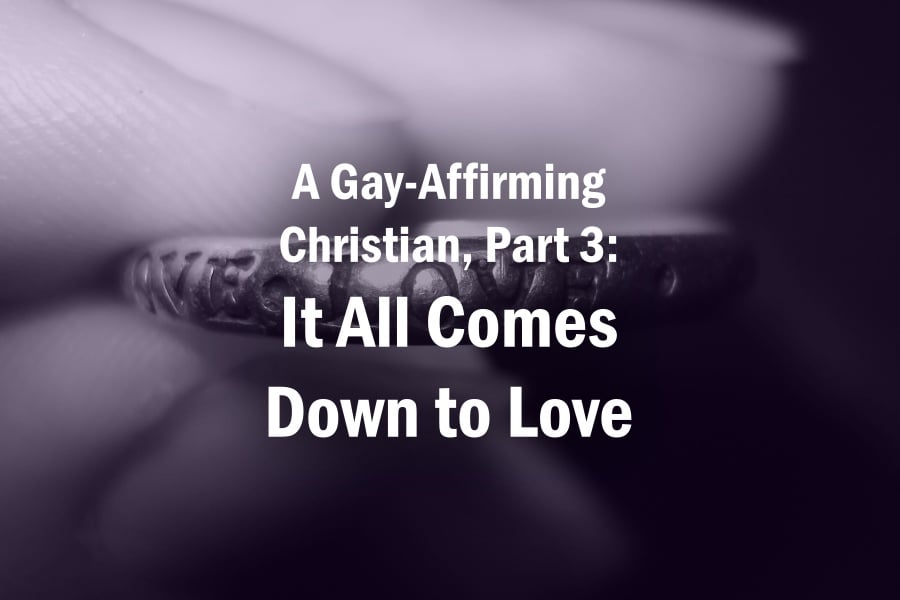This is the third post in a series arguing for the legitimacy of LGBTQ relationships from a Christian perspective. The previous posts lay the foundation for having this conversation and consider the overall view of marriage in the Bible. If you have not read them yet, please do so before reading this one.
As Christians, we do not live under long lists of rules and obligations. We have only two laws: love God with all your heart and soul and mind, and love your neighbor as yourself (Matthew 22:37–40).
The best way we show love to God is by showing love to our neighbors (Matthew 25:40). So Jesus and the Apostles frequently condensed the two laws into a single command: love one another (John 13:34–35).
James says that “you are doing the right thing if you obey the royal Law in keeping with the Scripture, ‘You must love your neighbor as yourself”” (James 2:8, ISV).
And Peter says, “Most important of all, you must sincerely love each other, because love wipes away many sins” (1 Peter 4:8, CEV).
But none of the other Apostles are as explicit about this as Paul:
You have been given freedom: not freedom to do wrong, but freedom to love and serve each other. For the whole Law can be summed up in this one command: “Love others as you love yourself.” (Galatians 5:13–14, TLB)
Whoever loves another person has fulfilled the Law. (Romans 13:8, CEB)
Love does no wrong to anyone. That’s why it fully satisfies all of God’s requirements. It is the only law you need. (Romans 13:10, TLB)
Just love. That’s all there is to it. There are no other restrictions or stipulations we need to worry about. Every moral decision we make comes down to a single factor—love. Anyone who says otherwise has Paul, Peter, James, and Jesus to contend with.
But what is love? The critics are on to something when they say that love needs to be defined. Neither Jesus nor the Apostles had a vague feeling of romance in mind when they taught that love fulfills the law. Love is something much more concrete.
Jesus summed it up this way:
In everything, treat others as you would want them to treat you, for this fulfills the law and the prophets. (Matthew 7:12, NET)
This “Golden Rule,” as many call it, is what Jesus calls the narrow gate that leads to life (Matthew 7:13–14). This is how we love others and thus fulfill the law.
How far do we take that? Here’s what John has to say:
This is how we know what real love is: Jesus gave his life for us. So we should give our lives for our brothers and sisters. (1 John 3:16, NCV)
And Paul adds quite a few specifics to our definition of love:
Love is patient and kind. Love is not jealous or boastful or proud or rude. It does not demand its own way. It is not irritable, and it keeps no record of being wronged. It does not rejoice about injustice but rejoices whenever the truth wins out. Love never gives up, never loses faith, is always hopeful, and endures through every circumstance. (1 Corinthians 13:4–7, NLT)
To combine all of this into one concise definition, love means consistently working for the good of others.
In as much as we consistently work for the good of others, we cannot sin. And we dare not label anything as sin which does not violate this principle.
To review, we’ve seen that God came up with marriage as the solution to being alone, and we’ve seen that Paul encourages such a relationship for those who desire it. Based on these facts, we can affirm that everyone should be permitted to pursue a relationship if they so desire.
However, we’ve also acknowledged that many people do not fit stereotypical gender identities and orientations. For such people, a person from the opposite gender may not be a suitable partner (Genesis 2:18). They must, therefore, be free to pursue a relationship with whatever genders they are oriented toward.
We’ve furthermore seen that the Bible offers no single model as the ideal for marriage, and we’ve seen that Christians are under no restrictions apart from the law of love. We cannot condemn any action or any relationship that consistently works for the good of others.
Since LGBTQ relationships are every bit as capable as “straight” relationships to work for the good of others, that leaves us with no reason to withhold our affirmation from them.
Let me restate that. As long as your relationships are carried out in love—that is, as long as they consistently work for the good of others—I affirm them. As a Christian, I believe I can do no other.
Having now established a positive case for affirming LGBTQ relationships, I will finally address the “clobber passages” (those texts of scripture frequently interpreted to condemn LGBTQ relationships) in the next and final post.
Posts in the Gay-Affirming Christian series:
- “Entering the Conversation”
- “The Biblical Case for Marriage”
- “It All Comes Down to Love”
- “Confronting the Clobber Passages”
See also, “It’s Time to Speak Out as a Gay-Affirming Christian.”













